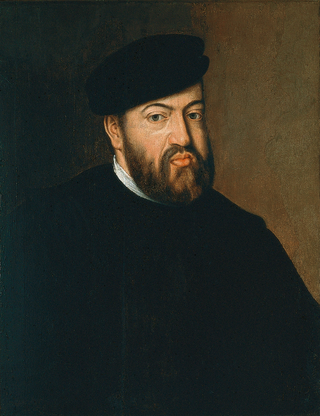
John III, nicknamed The Pious, was the King of Portugal and the Algarves from 1521 until his death in 1557. He was the son of King Manuel I and Maria of Aragon, the third daughter of King Ferdinand II of Aragon and Queen Isabella I of Castile. John succeeded his father in 1521 at the age of nineteen.

Dom John V, known as the Magnanimous and the Portuguese Sun King, was King of Portugal from 9 December 1706 until his death in 1750. His reign saw the rise of Portugal and its monarchy to new levels of prosperity, wealth, and prestige among European courts.

The Portuguese Catholic Church, or Catholic Church in Portugal, is part of the worldwide Catholic Church in communion with the Pope in Rome, under the Portuguese Episcopal Conference. The Catholic Church is the world's largest Christian organisation. It is Portugal's largest religion and its former state religion, and has existed in the territory since the Iberian Peninsula was ruled by the Roman Empire.

The Metropolitan Patriarchate of Lisbon is a Latin Church ecclesiastical territory or patriarchal archdiocese of the Catholic Church in Lisbon, the capital of Portugal.
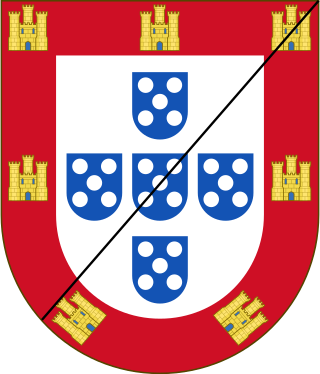
Duke of Aveiro was a Portuguese title of nobility, granted in 1535 by King John III of Portugal to his 4th cousin, John of Lencastre, son of Infante George of Lencastre, a natural son of King John II of Portugal.
Being one of the most ancient nation-states in Europe, Portugal has a long music history, which accompanied and strongly contributed to the development of the music history in Europe.
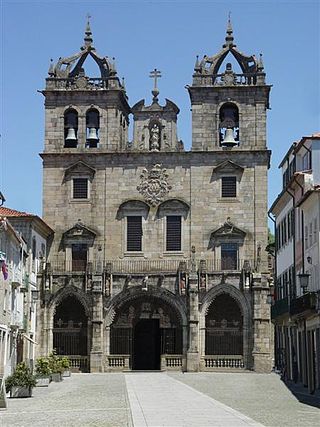
The Archdiocese of Braga is a Latin Church ecclesiastical territory or archdiocese of the Catholic Church in Portugal. It is known for its use of the Rite of Braga, a use of the liturgy distinct from the Roman Rite and other Latin liturgical rites.

The Diocese of Porto (Oporto) is a Latin Church diocese of the Catholic Church in Portugal. It is a suffragan of the archdiocese of Braga. Its see at Porto is in the Norte region, and the second largest city in Portugal.

The Roman Catholic Diocese of Funchal is a Latin Church ecclesiastical territory or patriarchal archdiocese of the Catholic Church in Portugal. It was originally created on 12 June 1514 by the papal bull Pro excellenti præeminentia from Pope Leo X, following the elevation of Funchal from a village to the status of city, by King Manuel I of Portugal. The diocese was a suffragan of the Archdiocese of Lisbon.

The Archdiocese of Évora is a Latin Church diocese of the Catholic Church in Portugal with Évora Cathedral as its see. It has as suffragans the diocese of Beja and diocese of Faro. The current archbishop of Évora is José Francisco Sanches Alves.
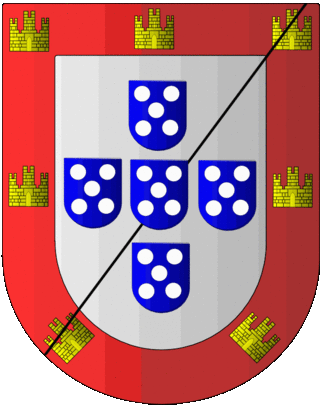
Pedro de Lencastre, or Peter of Lencastre, was the youngest son of Álvaro and Juliana of Lencastre, 3rd Dukes of Aveiro.
The Prior of Crato, was the traditional title given to the head of the Order of the Knights of St. John of Jerusalem (Hospitaller) in Portugal. It is a reference to the domains of the order around Crato, Portugal.

The Forty Conspirators, were a Portuguese nationalist group during the Iberian Union. The Conspirators were composed of forty men of the Portuguese nobility, and many clergy and soldiers. Their goal was to depose the House of Habsburg king, Philip III.
The Roman Catholic Diocese of Elvas was a Latin diocese in Portugal, located in the city Elvas, district of Portalegre in the Alentejo region and in the ecclesiastical province of Évora.

Tomás de Almeida was the first Patriarch of Lisbon, formerly Bishop of Lamego and later of Porto. Pope Clement XII elevated him to the cardinalate on 20 December 1737.
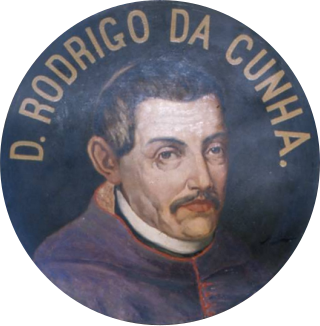
D. Rodrigo da Cunha was a Portuguese prelate of the first half of the seventeenth century and who, as Archbishop of Lisbon, played an important role in supporting the restoration of Portuguese independence from Spain.

D. João de Sousa was a Portuguese prelate, Bishop of Porto, Archbishop of Braga and Archbishop of Lisbon.

Fernando Martins Mascarenhas was a Portuguese scholar, theologian, and church leader. King Philip I appointed him Rector of the University of Coimbra and, later, Bishop of Faro; he later resigned to take up the post of Inquisitor General of Portugal.

Nuno da Cunha de Ataíde e Melo, more commonly referred to as Cardinal da Cunha, was a Portuguese Cardinal of the Catholic Church, and a politically important figure as a close advisor to King John V. Cardinal da Cunha occupied several positions at Court, as the King's chief chaplain, a chief minister and a significant member of the Council of State; he is perhaps most well-remembered as the Inquisitor-General of the Tribunal of the Holy Office from 1707 until his death in 1750.






















